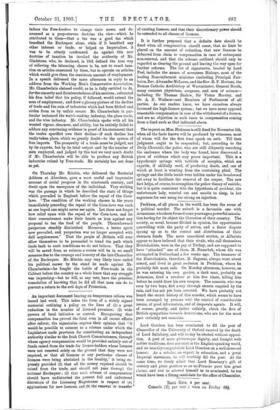On Thursday Mr. Ritchie, who delivered the Rectorial Address at
Aberdeen, gave a most useful and impressive account of social progress in the nineteenth century, and dwelt upon the emergence of the individual. Very striking was the passage in which he described the state of things which prevailed in England before the repeal of the Corn- laws. "The condition of the working classes in the years immediately preceding the repeal of the Corn-laws was such as one hoped one might never see again. Let them not forget bow relief came with the repeal of the Corn-laws, and let their remembrance make their hearts as iron against any proposal to tax the food of the people. Thenceforward pauperism steadily diminished. Moreover, a better spirit now prevailed, and pauperism was no longer accepted with dull • acquiescence." That the people of !Britain will ever allow themselves to be persuaded to tread the path which leads back to such conditions we do not believe. That they will be saved from so ruinous a course will be in no small measure due to the courage and honesty of the late Chancellor of • the Exchequer. Mr. Ritchie may very likely have ended his political career by the stand he made against Mr. Chamberlain—he fought the battle of Free-trade in the Cabinet before the country as a whole knew that any struggle was impending—but he will, at any rate, have the priceless consolation of knowing that he did all that man can do to prevent a return to the evil days of Protection.


















































 Previous page
Previous page